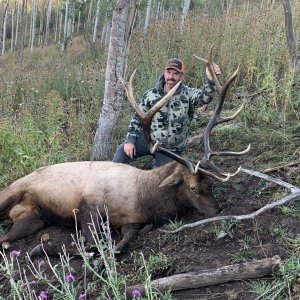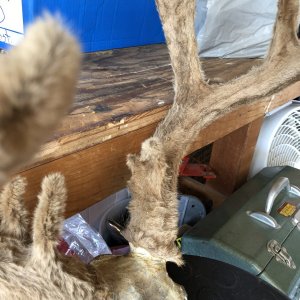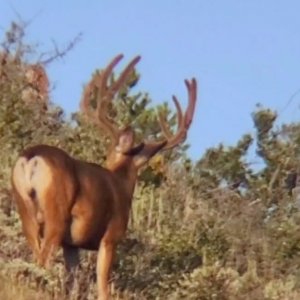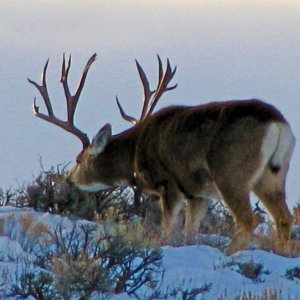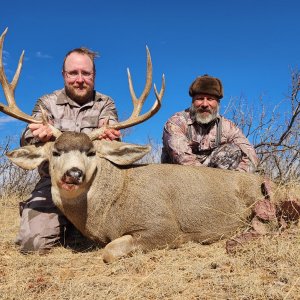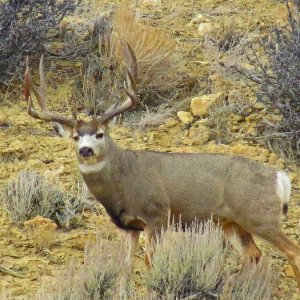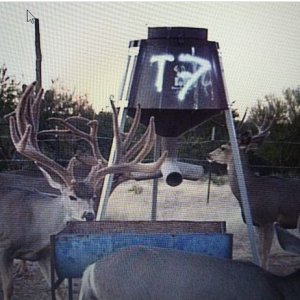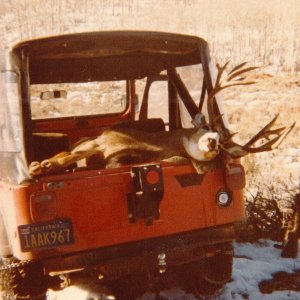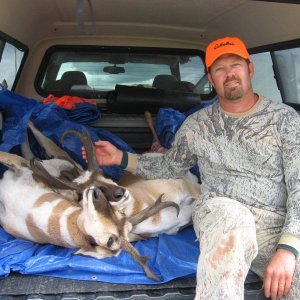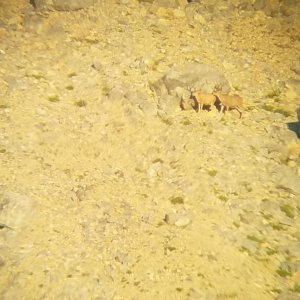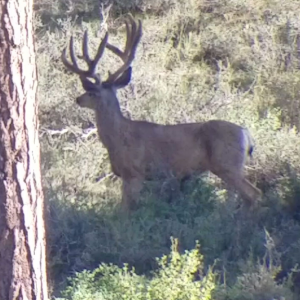According to documents by the western association of fish and wildlife agencys the Bush administration is attempting to unsurp wildlife managment authority from western states through an end of term, under the radar move on bighorn sheep. Wyoming state officials and wildlife advocates say that without consulting or even notifying any state agencys, the US forest service and the Animal and plant inspection agency have drafted an agreement that would in effect take jurisdiction over the transplantation of Bighorn sheep on national forests! This story was in the Casper star tribune 12-3, I wonder how many more surprises GWB is going to give hunters before its over? or should I say how many more sticks will be poked in our eyes, so much work by so many people to get sheep back on the mountain, this is a real slap in the face for hunters
You are using an out of date browser. It may not display this or other websites correctly.
You should upgrade or use an alternative browser.
You should upgrade or use an alternative browser.
Bighorn sheep
- Thread starter piper
- Start date
D
D13er
Guest
well I hope we don't get any of those clinton type monuments from him.
JB
JB
T
TFinalshot
Guest
LAST EDITED ON Dec-05-08 AT 07:22AM (MST)[p]As for the sheep, I'll bet it's some kind of restriction meant to keep wild sheep from exposing other domestic animals to disease. If you find out more about it, post it here.
As for monuments, No kidding d13, the best sheep hunting in the USA and the area that now produces 10x more BC rams than all the other states combined was "protected" by Clinton, and guess what, things improved, land values around the monument went up for those who want to sell, farmers still are farming (some who dont want to farm anymore are now getting millions for their places), ranchers are ranching, people are hunting, camping, fishing, and recreating and all of it was already public domain. As it's turned out, it's a win win for everyone - I know you love that term, not my favorite either, but after years of fighting and complaining, lots of people now are quietly, behind closed doors thankful. . . too bad they wont come out ant say it in public, but they will in time, their actions will speak louder then their words. . . . and our kids will have a place to recreate and hunt wild sheep.
Thanks,
Tony
www.tonybynum.com
"Roadless areas, in general, represent some of the best fish and wildlife habitat on public lands. The bad news is that there is nothing positive about a road where fish and wildlife habitat are concerned -- absolutely nothing." (B&C Professor, Jack Ward Thomas, Fair Chase, Fall 2005, p.10).
As for monuments, No kidding d13, the best sheep hunting in the USA and the area that now produces 10x more BC rams than all the other states combined was "protected" by Clinton, and guess what, things improved, land values around the monument went up for those who want to sell, farmers still are farming (some who dont want to farm anymore are now getting millions for their places), ranchers are ranching, people are hunting, camping, fishing, and recreating and all of it was already public domain. As it's turned out, it's a win win for everyone - I know you love that term, not my favorite either, but after years of fighting and complaining, lots of people now are quietly, behind closed doors thankful. . . too bad they wont come out ant say it in public, but they will in time, their actions will speak louder then their words. . . . and our kids will have a place to recreate and hunt wild sheep.
Thanks,
Tony
www.tonybynum.com
"Roadless areas, in general, represent some of the best fish and wildlife habitat on public lands. The bad news is that there is nothing positive about a road where fish and wildlife habitat are concerned -- absolutely nothing." (B&C Professor, Jack Ward Thomas, Fair Chase, Fall 2005, p.10).
Its the domestics that give the native sheep diseases, I believe this is an attempt by those in the domestic sheep business to try to stop the bringing of wild sheep back to native ranges, the full story is available on Casper star tribune archives 12/3/08. As far as d13 goes I don't think he is much of a hunter and wouldn't know a wild sheep if he saw one, I find that kind of thinking in people that hate to see future generations have a little wild country to explore
NeMont
Long Time Member
- Messages
- 12,632
States blast feds' sheep rule
By CHRIS MERRILL
Star-Tribune environment reporter
Tuesday, December 2, 2008 9:05 PM MST
LANDER -- The Bush administration is attempting to usurp wildlife management authority from Western states through an end-of-term, under-the-radar move on bighorn sheep, state officials and wildlife advocates charge.
Without consulting or even notifying any state agencies, the U.S. Forest Service and the Animal and Plant Health Inspection Service have drafted an agreement that would, in effect, take jurisdiction over the transplantation of bighorn sheep on national forests.
That's according to documents provided to the Star-Tribune by the Western Association of Fish and Wildlife Agencies and the state of Wyoming.
Although the federal action was drafted sometime in September, regional wildlife agencies didn't find out about it until the third week in November, state officials said.
According to the written agreement itself, it was created out of concern for the declining bighorn sheep population in the West. But critics say the real reason for the move is to protect domestic sheep producers, at the expense of bighorns.
Representatives of the Forest Service declined to talk on the record for this story. A spokesman for the agency in Washington, D.C., last week referred the Star-Tribune to a regional office, which then referred it back to the D.C. office. Multiple phone calls to the agency last week and on Monday were not returned.
The Western Association of Fish and Wildlife Agencies is a group of 23 state and provincial wildlife management departments from the American West and Canada. The Wyoming Game and Fish Department is a member.
This association, along with the state of Wyoming individually, responded sharply to the drafted agreement on Monday, because it would require that all wild sheep intended for reintroduction to national forests be tested for diseases by the Animal and Plant Health Inspection Service, among other things.
Reintroduction of bighorns to national forests would also require approval by the Forest Service.
Scathing rebuke
In a letter sent Monday to USDA Undersecretaries Mark Rey and Bruce Knight, the wildlife agencies' association condemned the agreement for being "drafted without input from any state wildlife agency, whose statutory authority to manage resident wildlife is clearly established."
As written, the action "contravenes existing law and policy, is unworkable in day-to-day management of the states' wildlife resources and produces a host of undesirable (and perhaps unintended) consequences," the letter contends.
Member agencies of the group know of no law or regulation providing the Forest Service with the authority to require disease testing of bighorn sheep or any other native resident wildlife, the group argues.
"States have long been acknowledged as having both ownership and management authority of resident wildlife, including its capture and translocation. The general health monitoring and management of bighorn sheep is the responsibility of state wildlife agencies, except for those bighorn sheep populations protected under the Endangered Species Act, and even then, federal authority lies with the U.S. Fish and Wildlife Service, not USDA."
APHIS, the letter continues, also has no jurisdiction over the movements of wild sheep.
"Collectively, we view this (action) as an attempt to usurp state wildlife agency jurisdiction and authority, and we will actively challenge that interference, if deemed necessary," the signatories conclude.
The federal move was also slammed in a separate letter sent to the same undersecretaries from the Wyoming Game and Fish Department, signed by the agency's director and the state veterinarian.
"Neither in enabling legislation nor elsewhere in the United States Code is (the U.S. Forest Service) granted explicit authority to supplant or supersede state wildlife management authority on USFS lands," the letter asserts. "Under the auspices of disease control, USFS attempts to bestow through (this interagency agreement) preemptive wildlife management authority over the State where it legally does not exist."
Domestic vs. wild
Bighorn sheep advocates also expressed outrage over the action, citing it as another example of wild sheep losing out to domestic sheep.
"It is another attempt by Mark Rey to run roughshod over state management," said Steve Torbit, regional executive director of the National Wildlife Federation. "It's totally out of balance, the way this is being handled. The livestock bring the diseases in, and then wildlife has to be eliminated in deference to livestock."
Torbit called the move a "power play" by commodity producers, whom the Bush administration has habitually favored in its public land management.
"This is an insult to state authority. It's an insult to wildlife management," Torbit said.
Gray Thornton, president of the Cody-based Wild Sheep Foundation, said his group is "perplexed" by this move by the outgoing administration.
"In many ways it's federal dominance over what is a state resource. It's meddling inappropriately in state sovereignty," Thornton said. "Mr. Rey recognizes the disease risk of domestic contact with wild sheep, but the proposed (action) and other actions appear to place the blame on a valuable public wildlife resource -- wild sheep -- and not on what most agree is the real issue: domestic sheep grazing in historical and occupied wild sheep habitat."
The real problem at hand is that wild sheep become infected by diseases from domestic sheep, Thornton said, and in this regard, Rey is directing his energies toward the "wrong vector."
The federal move was ultimately made to address wild sheep-domestic sheep conflicts in Idaho, not in Wyoming, Thornton said. The issue of where it is appropriate to have bighorns and domestic sheep has been at the center of ongoing controversy and legal battles in Idaho in recent years.
Wyoming developed a successful bighorn sheep working group years ago, Thornton said, which included all interested parties, including domestic sheep grazers, wildlife managers and wild sheep advocates.
Nonetheless, the federal action still affects Wyoming because it takes some management authority away from the state, even though the state is better equipped to manage bighorns and is more knowledgeable about all of the issues related to wild and domestic sheep, he said.
Eric Keszler, spokesman for the Wyoming Game and Fish Department, said the Cowboy State's success in managing wild sheep should be acknowledged by the federal agencies, and the state should be left alone when it comes to management decisions about bighorns.
"Additional actions by the federal government are not something that is needed here," Keszler said. "We work very well with (agricultural) producers to avoid conflicts."
Jim Magagna, executive vice president of the Wyoming Stock Growers Association, agreed that Wyoming has done a good job of addressing concerns about contact between domestic sheep and wild sheep.
"It's all arisen out of a pretty major dispute over in Idaho on the Payette National Forest," Magagna said. "We're fortunate in Wyoming that a number of years ago we formed a bighorn sheep working group and we developed a set of protocols to govern bighorn sheep and domestic sheep, and it has worked pretty well."
In their letter to the Bush administration, Game and Fish Department Director Steve Ferrell and State Veterinarian Walter Cook urged the federal government to continue to defer to the state on wildlife management decisions, as required by law.
"The State of Wyoming has a long-standing claim to primary jurisdiction over wildlife management throughout the State, including USFS lands within its borders," the signatories wrote. "The United States Supreme Court has repeatedly recognized that States possess broad trustee and police powers over wildlife within their jurisdictions and hold primary jurisdiction over the management of fish and wildlife on federal lands unless Congress explicitly declares otherwise."
By CHRIS MERRILL
Star-Tribune environment reporter
Tuesday, December 2, 2008 9:05 PM MST
LANDER -- The Bush administration is attempting to usurp wildlife management authority from Western states through an end-of-term, under-the-radar move on bighorn sheep, state officials and wildlife advocates charge.
Without consulting or even notifying any state agencies, the U.S. Forest Service and the Animal and Plant Health Inspection Service have drafted an agreement that would, in effect, take jurisdiction over the transplantation of bighorn sheep on national forests.
That's according to documents provided to the Star-Tribune by the Western Association of Fish and Wildlife Agencies and the state of Wyoming.
Although the federal action was drafted sometime in September, regional wildlife agencies didn't find out about it until the third week in November, state officials said.
According to the written agreement itself, it was created out of concern for the declining bighorn sheep population in the West. But critics say the real reason for the move is to protect domestic sheep producers, at the expense of bighorns.
Representatives of the Forest Service declined to talk on the record for this story. A spokesman for the agency in Washington, D.C., last week referred the Star-Tribune to a regional office, which then referred it back to the D.C. office. Multiple phone calls to the agency last week and on Monday were not returned.
The Western Association of Fish and Wildlife Agencies is a group of 23 state and provincial wildlife management departments from the American West and Canada. The Wyoming Game and Fish Department is a member.
This association, along with the state of Wyoming individually, responded sharply to the drafted agreement on Monday, because it would require that all wild sheep intended for reintroduction to national forests be tested for diseases by the Animal and Plant Health Inspection Service, among other things.
Reintroduction of bighorns to national forests would also require approval by the Forest Service.
Scathing rebuke
In a letter sent Monday to USDA Undersecretaries Mark Rey and Bruce Knight, the wildlife agencies' association condemned the agreement for being "drafted without input from any state wildlife agency, whose statutory authority to manage resident wildlife is clearly established."
As written, the action "contravenes existing law and policy, is unworkable in day-to-day management of the states' wildlife resources and produces a host of undesirable (and perhaps unintended) consequences," the letter contends.
Member agencies of the group know of no law or regulation providing the Forest Service with the authority to require disease testing of bighorn sheep or any other native resident wildlife, the group argues.
"States have long been acknowledged as having both ownership and management authority of resident wildlife, including its capture and translocation. The general health monitoring and management of bighorn sheep is the responsibility of state wildlife agencies, except for those bighorn sheep populations protected under the Endangered Species Act, and even then, federal authority lies with the U.S. Fish and Wildlife Service, not USDA."
APHIS, the letter continues, also has no jurisdiction over the movements of wild sheep.
"Collectively, we view this (action) as an attempt to usurp state wildlife agency jurisdiction and authority, and we will actively challenge that interference, if deemed necessary," the signatories conclude.
The federal move was also slammed in a separate letter sent to the same undersecretaries from the Wyoming Game and Fish Department, signed by the agency's director and the state veterinarian.
"Neither in enabling legislation nor elsewhere in the United States Code is (the U.S. Forest Service) granted explicit authority to supplant or supersede state wildlife management authority on USFS lands," the letter asserts. "Under the auspices of disease control, USFS attempts to bestow through (this interagency agreement) preemptive wildlife management authority over the State where it legally does not exist."
Domestic vs. wild
Bighorn sheep advocates also expressed outrage over the action, citing it as another example of wild sheep losing out to domestic sheep.
"It is another attempt by Mark Rey to run roughshod over state management," said Steve Torbit, regional executive director of the National Wildlife Federation. "It's totally out of balance, the way this is being handled. The livestock bring the diseases in, and then wildlife has to be eliminated in deference to livestock."
Torbit called the move a "power play" by commodity producers, whom the Bush administration has habitually favored in its public land management.
"This is an insult to state authority. It's an insult to wildlife management," Torbit said.
Gray Thornton, president of the Cody-based Wild Sheep Foundation, said his group is "perplexed" by this move by the outgoing administration.
"In many ways it's federal dominance over what is a state resource. It's meddling inappropriately in state sovereignty," Thornton said. "Mr. Rey recognizes the disease risk of domestic contact with wild sheep, but the proposed (action) and other actions appear to place the blame on a valuable public wildlife resource -- wild sheep -- and not on what most agree is the real issue: domestic sheep grazing in historical and occupied wild sheep habitat."
The real problem at hand is that wild sheep become infected by diseases from domestic sheep, Thornton said, and in this regard, Rey is directing his energies toward the "wrong vector."
The federal move was ultimately made to address wild sheep-domestic sheep conflicts in Idaho, not in Wyoming, Thornton said. The issue of where it is appropriate to have bighorns and domestic sheep has been at the center of ongoing controversy and legal battles in Idaho in recent years.
Wyoming developed a successful bighorn sheep working group years ago, Thornton said, which included all interested parties, including domestic sheep grazers, wildlife managers and wild sheep advocates.
Nonetheless, the federal action still affects Wyoming because it takes some management authority away from the state, even though the state is better equipped to manage bighorns and is more knowledgeable about all of the issues related to wild and domestic sheep, he said.
Eric Keszler, spokesman for the Wyoming Game and Fish Department, said the Cowboy State's success in managing wild sheep should be acknowledged by the federal agencies, and the state should be left alone when it comes to management decisions about bighorns.
"Additional actions by the federal government are not something that is needed here," Keszler said. "We work very well with (agricultural) producers to avoid conflicts."
Jim Magagna, executive vice president of the Wyoming Stock Growers Association, agreed that Wyoming has done a good job of addressing concerns about contact between domestic sheep and wild sheep.
"It's all arisen out of a pretty major dispute over in Idaho on the Payette National Forest," Magagna said. "We're fortunate in Wyoming that a number of years ago we formed a bighorn sheep working group and we developed a set of protocols to govern bighorn sheep and domestic sheep, and it has worked pretty well."
In their letter to the Bush administration, Game and Fish Department Director Steve Ferrell and State Veterinarian Walter Cook urged the federal government to continue to defer to the state on wildlife management decisions, as required by law.
"The State of Wyoming has a long-standing claim to primary jurisdiction over wildlife management throughout the State, including USFS lands within its borders," the signatories wrote. "The United States Supreme Court has repeatedly recognized that States possess broad trustee and police powers over wildlife within their jurisdictions and hold primary jurisdiction over the management of fish and wildlife on federal lands unless Congress explicitly declares otherwise."
D
D13er
Guest
>LAST EDITED ON Dec-05-08
>AT 07:22?AM (MST)
>
>As for the sheep, I'll bet
>it's some kind of restriction
>meant to keep wild sheep
>from exposing other domestic animals
>to disease. If you
>find out more about it,
>post it here.
>
>As for monuments, No kidding d13,
>the best sheep hunting in
>the USA and the area
>that now produces 10x more
>BC rams than all the
>other states combined was "protected"
>by Clinton, and guess what,
>things improved, land values around
>the monument went up for
>those who want to sell,
>farmers still are farming (some
>who dont want to farm
>anymore are now getting millions
>for their places), ranchers are
>ranching, people are hunting, camping,
>fishing, and recreating and all
>of it was already public
>domain. As it's turned
>out, it's a win win
>for everyone - I know
>you love that term, not
>my favorite either, but after
>years of fighting and complaining,
>lots of people now are
>quietly, behind closed doors thankful.
>. . too
>bad they wont come out
>ant say it in public,
>but they will in time,
>their actions will speak louder
>then their words. . .
>. and our kids
>will have a place to
>recreate and hunt wild sheep.
>
>
>
>
>Thanks,
>
>Tony
>
......every square inch of property in the country increased in value during the latest realestate craze, not because of "monument" status. You know as well as I do that "hunting" on these monuments was a special rule inserted because of the local opposition. Now that the frogs are in the pot and the water is warm, it will take nothing more than a line drawn through that special rule by an unelected beauracrat to stop all hunting there. You know it and I know it.
This sheep thing does suck.....I shouldn't have ventured so far from that topic.
JB
>AT 07:22?AM (MST)
>
>As for the sheep, I'll bet
>it's some kind of restriction
>meant to keep wild sheep
>from exposing other domestic animals
>to disease. If you
>find out more about it,
>post it here.
>
>As for monuments, No kidding d13,
>the best sheep hunting in
>the USA and the area
>that now produces 10x more
>BC rams than all the
>other states combined was "protected"
>by Clinton, and guess what,
>things improved, land values around
>the monument went up for
>those who want to sell,
>farmers still are farming (some
>who dont want to farm
>anymore are now getting millions
>for their places), ranchers are
>ranching, people are hunting, camping,
>fishing, and recreating and all
>of it was already public
>domain. As it's turned
>out, it's a win win
>for everyone - I know
>you love that term, not
>my favorite either, but after
>years of fighting and complaining,
>lots of people now are
>quietly, behind closed doors thankful.
>. . too
>bad they wont come out
>ant say it in public,
>but they will in time,
>their actions will speak louder
>then their words. . .
>. and our kids
>will have a place to
>recreate and hunt wild sheep.
>
>
>
>
>Thanks,
>
>Tony
>
......every square inch of property in the country increased in value during the latest realestate craze, not because of "monument" status. You know as well as I do that "hunting" on these monuments was a special rule inserted because of the local opposition. Now that the frogs are in the pot and the water is warm, it will take nothing more than a line drawn through that special rule by an unelected beauracrat to stop all hunting there. You know it and I know it.
This sheep thing does suck.....I shouldn't have ventured so far from that topic.
JB
NVBighorn
Long Time Member
- Messages
- 9,458
Looks like bad news to me. Funny thing is, the open range sheep industry is in the toilet. Amazes me they would have this much pull, even with Bush. Someone else is in this pot.
TFinal, can't tell if you are being facetious about protecting domestics from wild sheep diseases. I'll give you the benefit of the doubt and let you explain.
piper, I think D13er knows a tad more about bighorn sheep than you give him credit for.
TFinal, can't tell if you are being facetious about protecting domestics from wild sheep diseases. I'll give you the benefit of the doubt and let you explain.
piper, I think D13er knows a tad more about bighorn sheep than you give him credit for.
eelgrass
Long Time Member
- Messages
- 31,537
It's kind of ironic this story comes out of Wyoming. From what I understand wolves can and have had a major negative effect on wild sheep. So maybe more wild sheep will allow wolves to expand to new areas and continue to get a stronger foot hold.
How is that for a win win situation?
Eel
President Obama and Congress should leave gun rights alone. It's above their pay grade.
How is that for a win win situation?
Eel
President Obama and Congress should leave gun rights alone. It's above their pay grade.
T
TFinalshot
Guest
"According to the written agreement itself, it was created out of concern for the declining bighorn sheep population in the West. But critics say the real reason for the move is to protect domestic sheep producers, at the expense of bighorns."
If you believe the last sentance in the the above paragraph, then my statement stands. Like I said, it the domestic sheep industry worried about wild ones, just like with bison. . .
D13, you are completely off base with your reply to me. I dont think you should tell me what I know and what I dont know, particularly when it comes to national monuments and montana.
Tony
www.tonybynum.com
"Roadless areas, in general, represent some of the best fish and wildlife habitat on public lands. The bad news is that there is nothing positive about a road where fish and wildlife habitat are concerned -- absolutely nothing." (B&C Professor, Jack Ward Thomas, Fair Chase, Fall 2005, p.10).
If you believe the last sentance in the the above paragraph, then my statement stands. Like I said, it the domestic sheep industry worried about wild ones, just like with bison. . .
D13, you are completely off base with your reply to me. I dont think you should tell me what I know and what I dont know, particularly when it comes to national monuments and montana.
Tony
www.tonybynum.com
"Roadless areas, in general, represent some of the best fish and wildlife habitat on public lands. The bad news is that there is nothing positive about a road where fish and wildlife habitat are concerned -- absolutely nothing." (B&C Professor, Jack Ward Thomas, Fair Chase, Fall 2005, p.10).
I
isayNUNYA
Guest
Yeah D! Tony knows alot. Just last week I heard him say,"let go a my ears I know what I'm doing"
---------------------------------------
"I needed a cheesy signature saying like everyone else"
---------------------------------------
"I needed a cheesy signature saying like everyone else"
> ......every square inch of property
>in the country increased in
>value during the latest realestate
>craze, not because of "monument"
>status.
I beg to differ. The "Monument", not just the real estate craze, caused land values to increase in that area.
>You know as well
>as I do that "hunting"
>on these monuments was a
>special rule inserted because of
>the local opposition.
Where did you get that idea? Untrue.
>This sheep thing does suck.....I shouldn't
>have ventured so far from
>that topic.
>
>JB
Me too.
>in the country increased in
>value during the latest realestate
>craze, not because of "monument"
>status.
I beg to differ. The "Monument", not just the real estate craze, caused land values to increase in that area.
>You know as well
>as I do that "hunting"
>on these monuments was a
>special rule inserted because of
>the local opposition.
Where did you get that idea? Untrue.
>This sheep thing does suck.....I shouldn't
>have ventured so far from
>that topic.
>
>JB
Me too.
NVBighorn
Long Time Member
- Messages
- 9,458
http://online.wsj.com/article_email/SB122913940541103977-lMyQjAxMDI4MjE5NTExMzU5Wj.html
Wall Street Journal article
By STEPHANIE SIMON
A new policy issued by the Bush administration for managing fragile populations of bighorn sheep has angered Western environmentalists, hunters and state wildlife managers, who claim it is a move by the outgoing administration to reshape the Western landscape in favor of industry.
A new federal policy regulating how bighorn sheep are transported across state lines has drawn criticism from state officials and environmentalists in the West. They say it threatens efforts to restore the wild sheep.
Federal officials say the policy -- set out in a Memorandum of Understanding with the Forest Service -- is intended to protect bighorns from disease. But critics say it threatens their decadeslong effort to restore the wild sheep population from near-extinction.
Mark Rey, undersecretary for natural resources with the Department of Agriculture, who helped write the bighorn policy, dismissed the complaints. Officials from several Western states have sent him letters denouncing the policy as an illegal usurpation of state authority. Mr. Rey is reviewing the comments but said he sees no reason to change course.
The new policy requires that all wild bighorn be quarantined and tested for disease by federal labs before they can be moved across state lines by relocation programs designed to protect their populations. Mr. Rey says the current protocol, which leaves testing up to the states, is "hit or miss" and thus not good for the bighorn. "If everything is fine," he said, "why do we see diseases cropping up hither, thither and yon?"
But state officials worry the new policy could slow their efforts to protect the sheep. The crux of the problem, they say, is that domestic sheep too often intrude on bighorn territory -- leading to encounters that, for reasons not fully understood, are often fatal to the wild sheep.
State wildlife workers have tried to protect bighorns by relocating them as needed. They believe holding them in quarantine while federal labs perform blood analysis would slow the process and endanger the animals' health. Wild sheep get stressed easily in captivity.
"It's absolutely unworkable," said Dale Toweill, the wildlife coordinator for the Idaho Department of Fish and Game.
The federal policy was welcomed by the ranching industry, which raises hundreds of thousands of domestic sheep for wool and meat.
Ranchers hope a new policy will slow efforts to move bighorn sheep across habitats, leaving more land open for domestic producers.
Many ranching families have grazed their sheep on federal lands for generations. In recent years, however, the U.S. Forest Service has begun to revoke some of these grazing permits, out of fear the domestic sheep transmit fatal diseases to wild bighorn. Ranchers complain that there is no scientific proof their sheep are killing the bighorn. They hope the new policy will slow efforts to move wild sheep across habitats, leaving more land open for domestic producers.
"It's finally recognizing the other side," said Stan Boyd, executive director of the Idaho Wool Growers Association. "We think it'll help."
The sheep memo follows several decisions that have angered environmental interests in the West.
Those include regulations paving the way for oil-shale exploration and increased oil and gas leasing near national parks. Some of the decisions could be reversed by the incoming Obama administration. But Mr. Rey and his critics said they don't believe sheep-testing protocols would be a priority.
The Department of Agriculture hasn't written the bighorn-testing protocol, and Mr. Rey said all decisions, including the length of any quarantine, will be open to public comment.
"This is going to be done by people with Ph.D.s in veterinary science," Mr. Rey said. "I don't see it rising to the level of political involvement."
Wall Street Journal article
By STEPHANIE SIMON
A new policy issued by the Bush administration for managing fragile populations of bighorn sheep has angered Western environmentalists, hunters and state wildlife managers, who claim it is a move by the outgoing administration to reshape the Western landscape in favor of industry.
A new federal policy regulating how bighorn sheep are transported across state lines has drawn criticism from state officials and environmentalists in the West. They say it threatens efforts to restore the wild sheep.
Federal officials say the policy -- set out in a Memorandum of Understanding with the Forest Service -- is intended to protect bighorns from disease. But critics say it threatens their decadeslong effort to restore the wild sheep population from near-extinction.
Mark Rey, undersecretary for natural resources with the Department of Agriculture, who helped write the bighorn policy, dismissed the complaints. Officials from several Western states have sent him letters denouncing the policy as an illegal usurpation of state authority. Mr. Rey is reviewing the comments but said he sees no reason to change course.
The new policy requires that all wild bighorn be quarantined and tested for disease by federal labs before they can be moved across state lines by relocation programs designed to protect their populations. Mr. Rey says the current protocol, which leaves testing up to the states, is "hit or miss" and thus not good for the bighorn. "If everything is fine," he said, "why do we see diseases cropping up hither, thither and yon?"
But state officials worry the new policy could slow their efforts to protect the sheep. The crux of the problem, they say, is that domestic sheep too often intrude on bighorn territory -- leading to encounters that, for reasons not fully understood, are often fatal to the wild sheep.
State wildlife workers have tried to protect bighorns by relocating them as needed. They believe holding them in quarantine while federal labs perform blood analysis would slow the process and endanger the animals' health. Wild sheep get stressed easily in captivity.
"It's absolutely unworkable," said Dale Toweill, the wildlife coordinator for the Idaho Department of Fish and Game.
The federal policy was welcomed by the ranching industry, which raises hundreds of thousands of domestic sheep for wool and meat.
Ranchers hope a new policy will slow efforts to move bighorn sheep across habitats, leaving more land open for domestic producers.
Many ranching families have grazed their sheep on federal lands for generations. In recent years, however, the U.S. Forest Service has begun to revoke some of these grazing permits, out of fear the domestic sheep transmit fatal diseases to wild bighorn. Ranchers complain that there is no scientific proof their sheep are killing the bighorn. They hope the new policy will slow efforts to move wild sheep across habitats, leaving more land open for domestic producers.
"It's finally recognizing the other side," said Stan Boyd, executive director of the Idaho Wool Growers Association. "We think it'll help."
The sheep memo follows several decisions that have angered environmental interests in the West.
Those include regulations paving the way for oil-shale exploration and increased oil and gas leasing near national parks. Some of the decisions could be reversed by the incoming Obama administration. But Mr. Rey and his critics said they don't believe sheep-testing protocols would be a priority.
The Department of Agriculture hasn't written the bighorn-testing protocol, and Mr. Rey said all decisions, including the length of any quarantine, will be open to public comment.
"This is going to be done by people with Ph.D.s in veterinary science," Mr. Rey said. "I don't see it rising to the level of political involvement."
Maybe you all ought to consider the facts on what has happened. You have sheep operators who have had permits for a Century, or at least in the family, who have had their permits taken away by the courts, because of bighorn sheep transplants. So you are a sheep operator, the State transplants 70 wild sheep near the allotment that you are permitted to run domestic sheep. Then the environmental groups use the Bighorns as a wrench and claim that the domestic sheep pose a threat to the wild sheep (because of the risk of disease transfer) and sue the Forest Service, BLM, or Rancher. The Courts rule in favor of the environmental groups and the sheep operator no longer has his permit to put sheep on the allotment. You can see how the rancher would be ticked. It seems to him that he has been unfairly dealt with and his lifestyle has been taken away by those using the Bighorn sheep as a tool to get domestic sheep off public land.
Not saying what is right and what is wrong, I am just giving you part of the otherside of the story. The real hosers in this are the environmental groups.
Not saying what is right and what is wrong, I am just giving you part of the otherside of the story. The real hosers in this are the environmental groups.
T
TFinalshot
Guest
LAST EDITED ON Dec-18-08 AT 01:42PM (MST)[p]Hey rackster, i'm sympathetic since I'm from rancher/farming lifestyle, so I completely get the arguments both ways.
But, help me answer this, how does what you say or this issue for example, differ from any other where one side says "yea but it's our lifestyle" and "our family's history," and the other says "yea but your lifestyle is killing mine?" There are countless examples of this all over the place. Should we have stopped the development of the west by banning the automobile in order to save the stage coach diver, or how about the robot to save the workers, or how about the hunter and the guides who use to hunt a lot more, kill a lot more, but now cant?
Things change. I'm not supporting wild vs. non wild sheep in this case, I'm saying this is just sneaky backdoor politics meant to serve a very small special interest, sometimes you're the windshield and sometimes you're the bug . . . but historical use for a short time span in history is of little consequence to a desperate and changing society. . . The argument of "I was here first" and "this is my lively hood" sure has some merit, but it always has and always will giveway to the pressures of power, politics and the changing views of society. I'm not saying youre wrong, i'm saying things change, your "rights" are limited when it comes to public land and Bush has NO more right to change that than you do. It's up to the people. . .
Are you okay if I get legislation passed that says people cant hunt deer anymore because youre killing my livelyhood?
www.tonybynum.com
"Roadless areas, in general, represent some of the best fish and wildlife habitat on public lands. The bad news is that there is nothing positive about a road where fish and wildlife habitat are concerned -- absolutely nothing." (B&C Professor, Jack Ward Thomas, Fair Chase, Fall 2005, p.10).
But, help me answer this, how does what you say or this issue for example, differ from any other where one side says "yea but it's our lifestyle" and "our family's history," and the other says "yea but your lifestyle is killing mine?" There are countless examples of this all over the place. Should we have stopped the development of the west by banning the automobile in order to save the stage coach diver, or how about the robot to save the workers, or how about the hunter and the guides who use to hunt a lot more, kill a lot more, but now cant?
Things change. I'm not supporting wild vs. non wild sheep in this case, I'm saying this is just sneaky backdoor politics meant to serve a very small special interest, sometimes you're the windshield and sometimes you're the bug . . . but historical use for a short time span in history is of little consequence to a desperate and changing society. . . The argument of "I was here first" and "this is my lively hood" sure has some merit, but it always has and always will giveway to the pressures of power, politics and the changing views of society. I'm not saying youre wrong, i'm saying things change, your "rights" are limited when it comes to public land and Bush has NO more right to change that than you do. It's up to the people. . .
Are you okay if I get legislation passed that says people cant hunt deer anymore because youre killing my livelyhood?
www.tonybynum.com
"Roadless areas, in general, represent some of the best fish and wildlife habitat on public lands. The bad news is that there is nothing positive about a road where fish and wildlife habitat are concerned -- absolutely nothing." (B&C Professor, Jack Ward Thomas, Fair Chase, Fall 2005, p.10).
do the rights of a few trump the rights of many on public lands? the old world sheep that were brought here give the native sheep diseases that kill them, its a known fact, was it a good thing to wipe so many animals off their native habitat? they lived there for thousands of years, Gifford Pinchot said the forest service mission should be "to do the most good for the most amount of people for the longest amount of time" seems like good policy to me. There is no win win situation on this but the lack of honesty by the Bush team is disturbing
TF - From your comments, it does not sound like you are sympathetic to the ranching/farming industry. But really I don't care. The Constitution was written to protect individual rights not to protect special interest groups. And yes, if hunting came a long as a new sport and was hurting somebody's livelihood, then yes that somebody's rights should be protected to continue their livelihood. Further, if you look at Amendment 10 of the Constitution, it states that all powers not specifically given to the government shall be given to the States. Does the federal government have the power to manage land or wildlife. The Constitution says no, but yet look at all the government intereference and laws we have in these areas. Really this is all Unconstitutional, but not much we can do about it. So frankly, I don't think Bush should be medalling anymore than than what has been done in the past.
TF- yes change happens, but the Constitution and the rights it gives to individuals should not!!!
Piper - there are plenty of places to transplant Bighorn sheep that do not have domestic sheep. There are plenty of Bighorn populations with no risk of contact with domestic sheep that can be augmented. So the need to force the domestic sheep operator out is really not a need at all, but rather a personal agenda for a few people to get rid of grazing on public land. So should the rights of a few trump the rights of many on public land? Well, isn't that whats happening? A few special interest groups have been slowly, through Bighorn sheep, taking the rights away from sheep operators.
Now piper, talk about honesty, should these special interest groups go to court and fight the issue they are really interested in "getting rid of domestic grazing on public lands" or should they continue to hide behind Bighorn sheep and other tools like the Endangered Species Act, to get there agenda's through? On top of that, Don't talk about Bush being dishonest when you have Clinton and OBAMA, which are the two biggest lying Presidents (or rather Obama soon to be President) in the history of this great nation.
Now I like Bighorns just like anyone else. We can have healthy populations of bighorns with separation from domestic sheep as well as domestic sheep operators. We have healthy populations of bighorns and there are many more places we can put them without transplants in areas near domestic sheep grazing. Surely we can allow the sheep operator his rights as well as yours.
TF- yes change happens, but the Constitution and the rights it gives to individuals should not!!!
Piper - there are plenty of places to transplant Bighorn sheep that do not have domestic sheep. There are plenty of Bighorn populations with no risk of contact with domestic sheep that can be augmented. So the need to force the domestic sheep operator out is really not a need at all, but rather a personal agenda for a few people to get rid of grazing on public land. So should the rights of a few trump the rights of many on public land? Well, isn't that whats happening? A few special interest groups have been slowly, through Bighorn sheep, taking the rights away from sheep operators.
Now piper, talk about honesty, should these special interest groups go to court and fight the issue they are really interested in "getting rid of domestic grazing on public lands" or should they continue to hide behind Bighorn sheep and other tools like the Endangered Species Act, to get there agenda's through? On top of that, Don't talk about Bush being dishonest when you have Clinton and OBAMA, which are the two biggest lying Presidents (or rather Obama soon to be President) in the history of this great nation.
Now I like Bighorns just like anyone else. We can have healthy populations of bighorns with separation from domestic sheep as well as domestic sheep operators. We have healthy populations of bighorns and there are many more places we can put them without transplants in areas near domestic sheep grazing. Surely we can allow the sheep operator his rights as well as yours.
Rackster- Im not so sure there are very many places to reintroduce bighorns, in many places the bighorns living now are very close to domestic sheep and we see dieoffs somewhere every year, you are presuming that all these groups want to "git rid of grazing on public lands", Im sure some do, but I think most would simply like to see more bighorns returned to their native habitat, there is a great demand for that.

